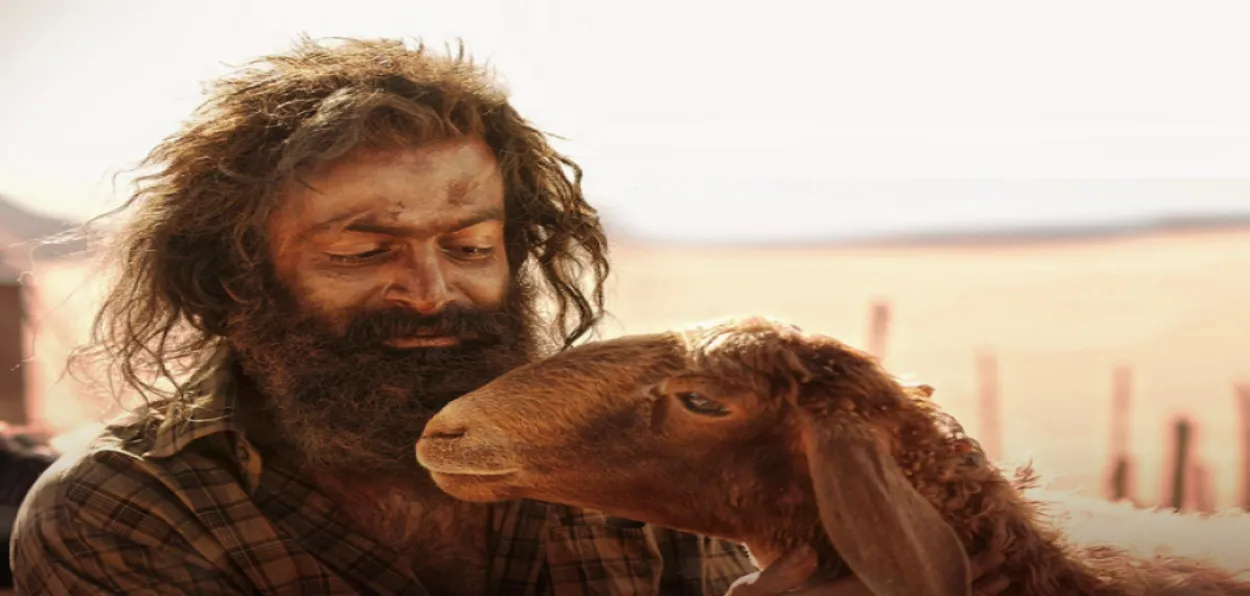
Aasha Khosa/New Delhi
Did the Malayalam film, Aadujeevitham: The Goat Life, released on the OTT platform Netflix in mid-2024, shake the Arab world, especially Saudi Arabia, about the sub-human working conditions of expatriates under the Kafala system, and make Riyadh abolish it?
The kafala, or sponsorship, system defines the relationship between foreign workers and their local sponsor, or Kafeel, which is usually their employer.
In a landmark labour reform, Saudi Arabia officially scrapped the decades-old Kafala (sponsorship) system. The move, announced in June 2025 as part of the kingdom’s broader Vision 2030, aimed at reshaping the rights of more than 10 million migrant workers, including over 2.5 million Indians.
The film Aadujeevitham (also known as The Goat Life) depicts the abuses of the kafala system in a Arab country and was rated highly by the audience.
The protagonist of the film is Najeeb, a young man from Kerala who travels to a Gulf country for a better life. The movie has brought a true heart-wrenching story of Najeeb Mohammad, played by Prithviraj Sukumaran.
 Prithviraj Sukumaran as Najeeb in the film
Prithviraj Sukumaran as Najeeb in the film
Aadujeevitham: The Goat Life was also released in theatres and later on Netflix. The film’s release on Netflix sparked discussion and controversy in the Gulf states over the treatment of migrant workers.
It received a strongly negative reaction in Saudi Arabia, where it was banned. Critics in the country argued that the movie unfairly portrayed Saudi society and reinforced negative stereotypes about the treatment of migrant workers.
The Saudis were livid at the film’s "dramatically exaggerating" the isolated case of abuse and presenting an outdated, one-dimensional, and flawed depiction of Saudi culture.
The film's director, Blessy, and Omani actor Talib Al Balushi (who played the cruel "kafeel" or sponsor) were forced to address the backlash.
Al Balushi insisted that people differentiate between a film role and reality. Blessy, meanwhile, released a statement emphasising that the film also highlights the kindness of other Arab people.
It achieved a worldwide gross of approximately ₹160.08 crore. Its domestic collection of ₹100.58 crore makes it the third-highest-grossing Malayalam film of all time worldwide.
The film was also released in English under the title The Goat Life. It's an adaptation of the award-winning 2008 novel Goat Days by Benyamin. The story is based on the real experience of a Malayalee expatriate in Saudi Arabia.
 Indian workers in a Gulf country
Indian workers in a Gulf country
However, it also sparked wider discussions about the kafala (sponsorship) labour system prevalent in Gulf countries, which many critics argue enables the exploitation of migrant workers. Some observers noted that the outrage focused on the film's negative depiction, rather than the documented abuses within the system.
Earlier, a documentary Maid in Hell, on this topic was released in 2018. This documentary, available on YouTube, focuses on the abuse and exploitation faced by female migrant domestic workers in the Middle East under the kafala system. It features interviews with employment agents and former domestic workers who describe their harrowing experiences.
Like a Spiral (2021), another documentary that highlights the stories of five migrant domestic workers in Lebanon. Through their voices and experiences, the film denounces the loss of freedom under the kafala system.
Saudi Arabia scrapping the decades-old Kafala (sponsorship) as part of the kingdom’s broader Vision 2030 reforms, is expected to reshape the rights of more than 10 million migrant workers, including over 2.5 million Indians.
 Protest against Kafala system in a US university
Protest against Kafala system in a US university
Human rights bodies long argued that this system often led to worker exploitation and abuse, as employees were left with little legal recourse if their employers withheld salaries or passports.
Now, the expatriates in Saudi can jobs without the employer’s approval after completing their contract or giving due notice, travel abroad without requiring an exit or re-entry permit from their sponsor.
Ending the Kafala system is also seen as a move to improve Saudi Arabia’s human rights record and meet international labour standards, particularly those set by the International Labour Organisation (ILO).
READ MORE: Tariq Alam's school in Kapali has changed the destiny of workers' children
This has come as a major relief to an estimated 1.34 crore foreign workers, who account for about 42 percent of the Kingdom's population. Saudi Arabia and other countries depend heavily on migrants for construction work, agriculture, domestic work, and more.
